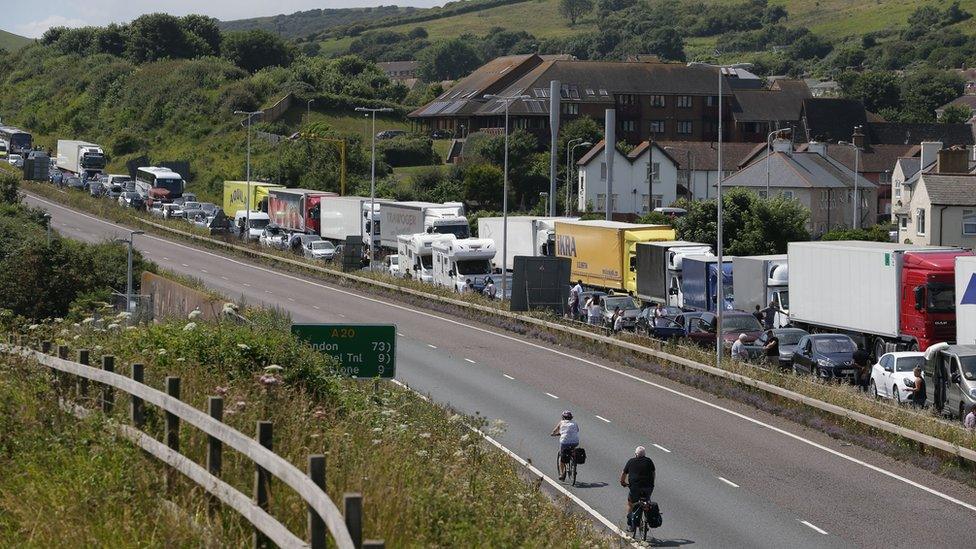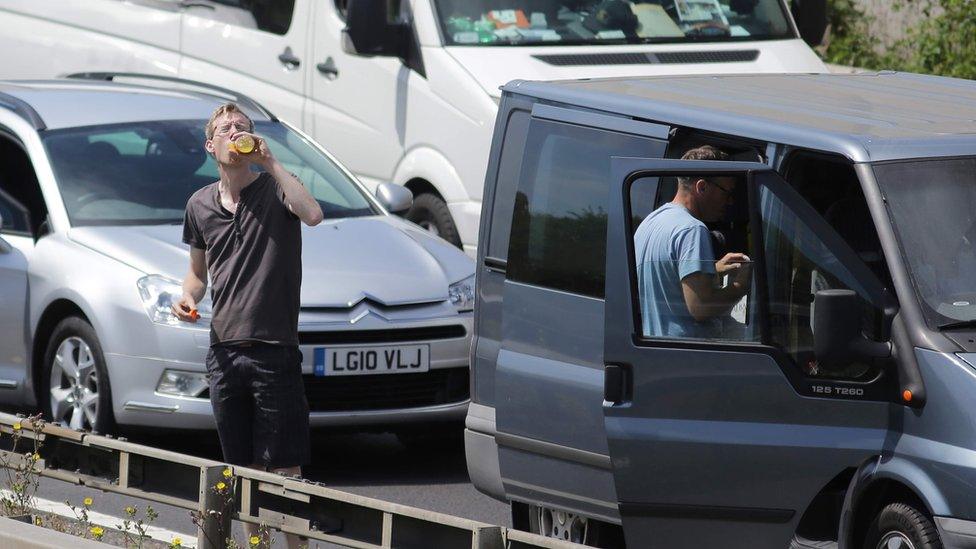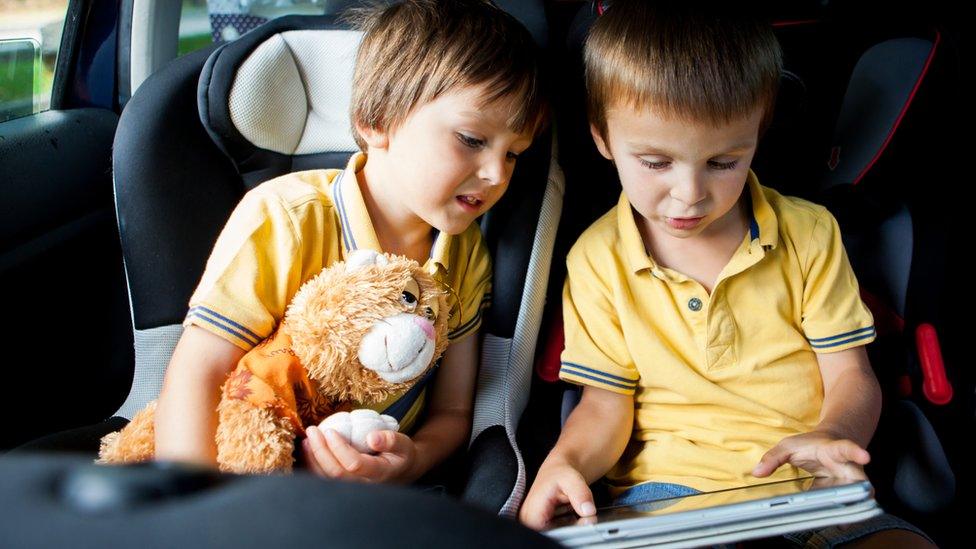Seven ways to survive a 14-hour traffic jam
- Published

The helicopter cameras showed cars snaking back for miles as thousands of motorists were caught in travel chaos on the way to Dover and Folkestone last weekend. This weekend's traffic is not expected to be so bad, but long queues are still possible... in fact accidents and roadworks on a summer weekend can cause big delays on any busy road. Here are seven tips for surviving a mammoth queue in hot weather.
1. Fill up with petrol
The RAC recommends heading out with a full tank of petrol so there is no risk of running out as you crawl along, possibly for hours on end. The AA advises checking the car's coolant levels and cooling system as well as tyre pressures. Tyres that are worn or the wrong pressure are more likely to blow in higher temperatures. Fitting car sunshades can help keep passengers cooler in the back.
2. Keep your cool
Your first reaction is likely to be one of annoyance, followed by a sense of powerlessness as the hours tick by. Jacqueline Barnes, professor of psychological sciences at the University of London, suggests focusing on the fact that the ordeal is temporary and that many others are in the same situation.
Whatever you do, don't lash out at your travelling companions. "Remember that whoever made the booking is not to blame," Barnes says.
There are also ways you can turn your experience into something positive, she points out. If you are online, you can help other people by posting information about the situation on the ground. And whatever happens, you will have something to tell your friends once it is over.
3. Switch the engine off
The RAC recommends you switch off your car engine as soon as it becomes clear the traffic will be stationary for some time, in order to conserve fuel and keep pollution to a minimum. If you need to start the car for short periods in order to run the air conditioning, charge your electronic devices at the same time, a spokesman suggests, as charging them without the engine running will drain the car battery.
In extreme traffic queues, such as those last weekend around Folkestone and Dover, the RAC advises motorists and passengers to get out of their cars to stretch their legs from time to time, while keeping an eye out for moving vehicles.
"In doing so you should be very conscious you are still on a road," the spokesman says, "and that emergency vehicles could be using the hard shoulder or motorcyclists riding between stationary vehicles."

4. Prepare to pee outside
While it's important to stay hydrated there are ways of reducing your need for a toilet break. Avoid drinking caffeine or alcohol just before and during the journey as they can irritate the bladder, with the result that you need to go more frequently.
"Drinks should ideally be sipped at regular intervals throughout the journey," says Dr Emma Derbyshire, who advises the Natural Hydration Council. If you gulp water faster than your body needs it, you will need to urinate more often.
If you do need to go to the toilet while stuck in stationary traffic, your choices are limited. Men may be able to discreetly use a plastic bottle. Otherwise the only option may be to explore the verge beyond the hard shoulder, using a scarf or towel to protect your dignity. It may be a good idea to have toilet paper in the glovebox... and wet wipes or hand sanitiser for cleaning hands.
5. Keep the children happy
If you have children in the back, provide books and activities to keep them occupied. Jacqueline Barnes also suggests playing games, external such as Guess the Animal, where one person thinks of a creature and the others ask questions like "Can it fly?" (The traditional game of I Spy may not be a great success when the car is stationary.)
Adults can also head off children's tantrums by not getting agitated themselves. "Children respond very quickly to stress, anxiety and anger in the their parents so keeping calm is always better," she says. "Explain that you are sure the ferry company will get them on a boat, even if it does not leave at the time they had expected. And focus on talking about things you will do once you reach your destination rather than blaming the police, or customs. Those kinds of ideas are non-productive and negative."
Games can be played on tablet computers or phones, but remember most devices have a battery life of about 10 hours.

6. Take food... and enough water
You're sure to feel hungry after several hours stuck on the road, but nutritionist Charlotte Stirling-Reed suggests avoiding monster bags of cookies or crisps.
"Junk food can give you short bursts of energy but it won't be sustained, so you may feel tired and lacking energy fairly quickly," she says.
"Crackers and breadsticks are great options but something like cheese won't taste great in a hot car. Peanut butter dip or spreads are better or marmite as they keep better in the heat.
"Nuts are my favourite glovebox snack - they are a great source of energy and are full of vitamins, minerals and fibre. They're easy to store without them going off. Fruit like apples and bananas are great. If you can pack a tub of sliced watermelon, that's great for hydration too."
The Natural Hydration Council advises carrying plenty of drinks in the car. If you are held up for a long time, the amount of fluid you need steadily adds up. The European Food Safety Authority recommends that men should drink four 500ml bottles of fluid every day, external, and that women should drink just over three 500ml (17.5 fl oz) bottles. Children aged four to 13 should be having two to three bottles.
By that measure, Dr Emma Derbyshire points out, a family of two adults and two children stuck in traffic for 14 hours would need about eight litres (14 pints) of water or other drinks.
7. Stay informed
Local radio stations give regular travel information. Meanwhile Highways England powers an interactive live traffic map, external of England. This shows how quickly traffic is flowing on motorways and many other major roads. You can also follow local council traffic accounts on Twitter. This information may also help you find an alternative route, if you get a chance to turn off the road that is jammed.
Follow @BBCNewsMagazine, external on Twitter and on Facebook, external